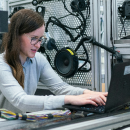
Astra’s research results and their impact on the economic fabric
In the previous articles we began to dissect two fundamental axes of which Astra is composed: the development in terms of infrastructure and hardware on the one hand and in terms of digitization and software for space on the other. The third work package is no less important because it is dedicated to a crucial issue: the impact of the project on research, economic actors and the communities in general.
In this sense, there is a twofold stated objective: first, to protect and valorize the results of the research carried out during the project and second, to assess its economic, social and environmental sustainability. The creation of a Center for Ethical Technology Transfer and Impact Management is in fact a key step in this work phase.
The first action of this project revolves around two fundamental concepts: that of intellectual property and that of valorization. They are two sides of the same coin. In fact, recognizing the importance of the work done means, on the one hand, protecting the heritage of ideas and the original and innovative outcome of research, and on the other hand, it also means extrapolating the elements of interest derived from it, to then put this work at the service of the community.
At the output level, these two directions will result in patents, registrations, licenses, exploitation agreements and collaboration with various organizations, entities and institutes.
The natural consequence of valorization is knowledge transfer: the second action of this third work package of Astra is dedicated to this aspect. This transfer will take place through collaboration deals with various research institutions but also with industries (with a special focus on small and medium-sized enterprises) that will be able to make the most of the knowledge acquired by Astra’s researchers. Numerous relationships, collaborations on research projects and training processes will be formalized in this context.
In addition, spin-offs will be established by Astra's affiliates, namely the University of Perugia, the National Institute of Astrophysics (Inaf), the Bruno Kessler Foundation and Thales Alenia Space SpA, to accelerate and make knowledge transfer more direct. It is no coincidence that qualified personnel will be hired specifically for this purpose.
Finally, an action of this spoke is dedicated to evaluating and monitoring the social, economic and environmental impact of the technologies developed during the project. This will be done through publications, seminars and evaluation reports on the topic, as well as through the generation of appropriate ethical use licenses. The evaluation is done both by reconstructing ex ante the impact of individual projects and by reporting ex post.
The latter strand of Astra thus also represents a public recounting by the key players in the spoke-primarily the Gssi, which is responsible for it, and, in general, of the restitution to the community of the results achieved through Pnrr funding to the Vitality ecosystem.

